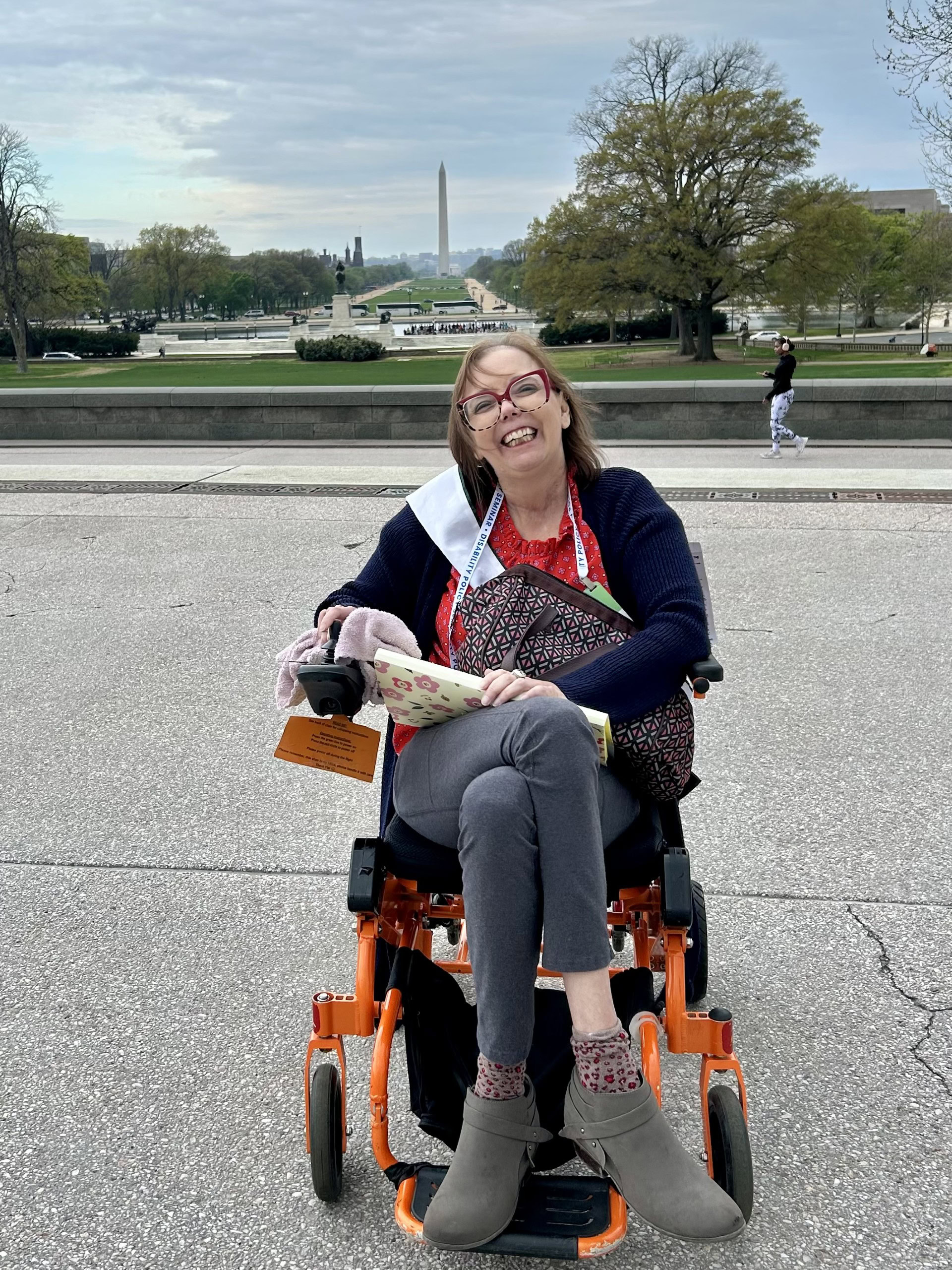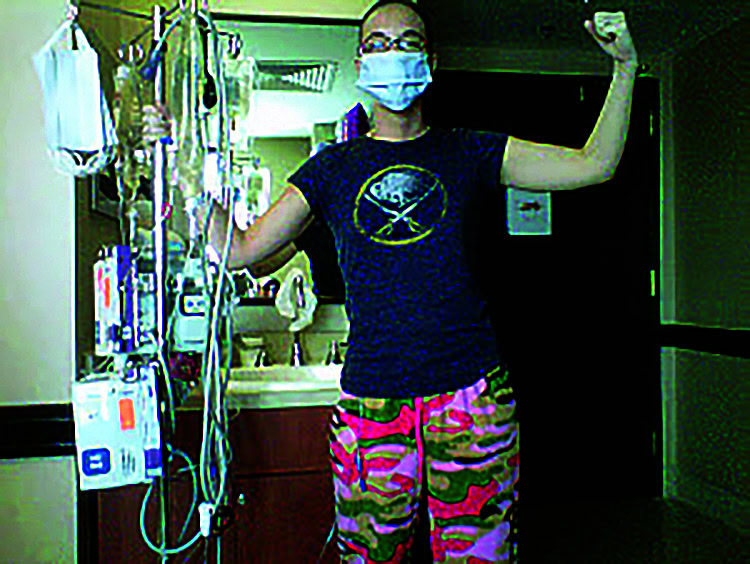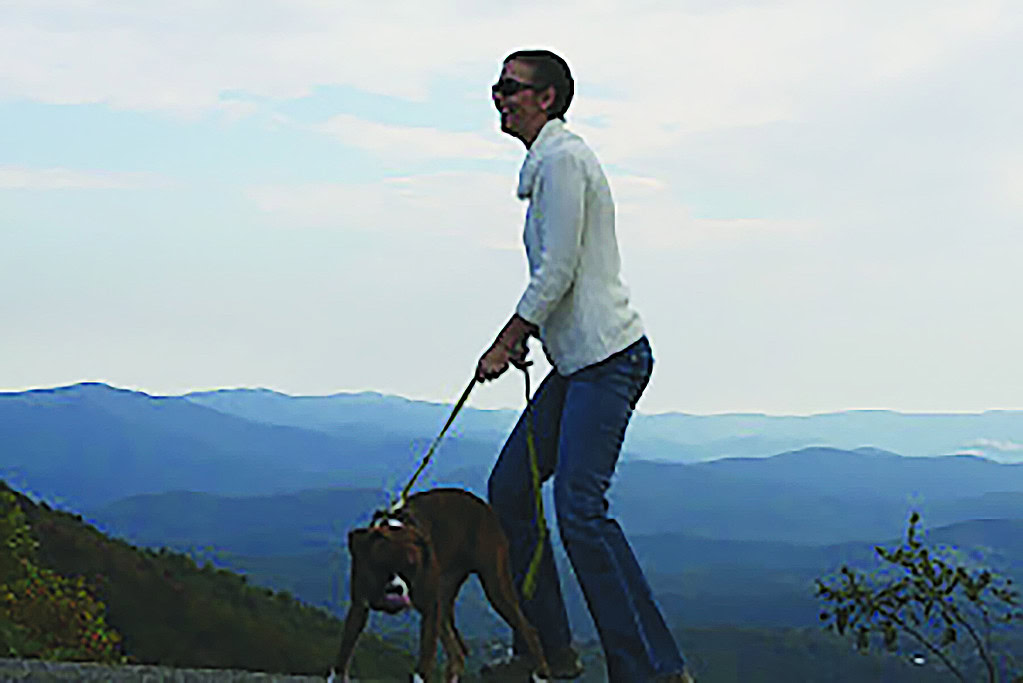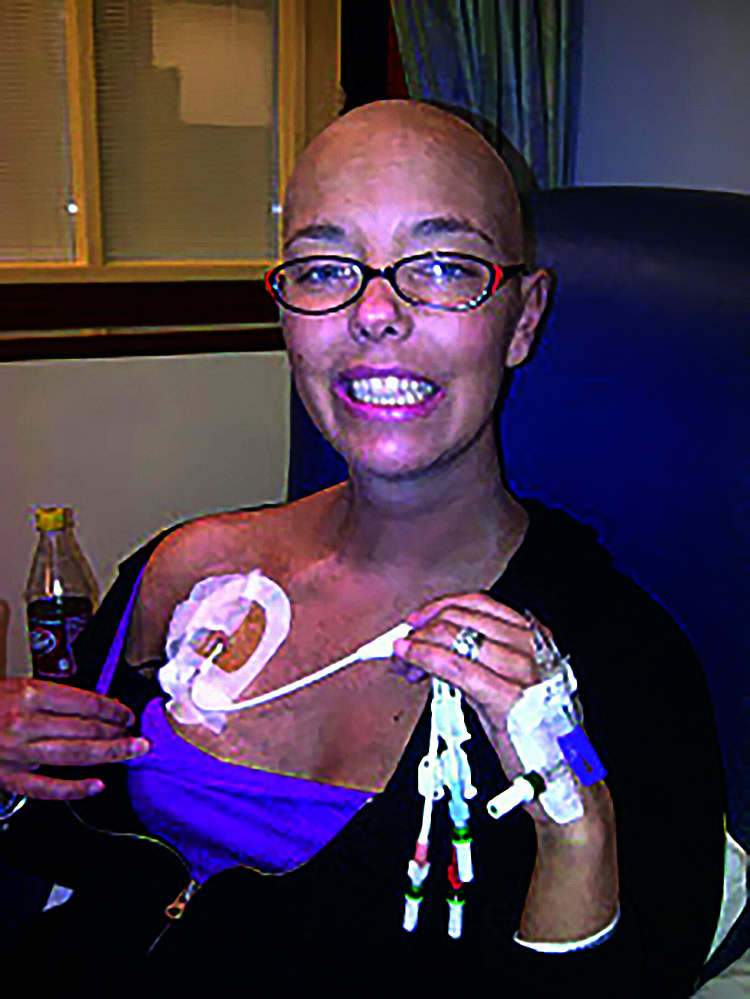
I’ve been writing this column for nine months, but I’ve never shared my own story of how I became disabled: via cancer and chemo.
At the age of 30, I started to feel tired, my hair started falling out and I became mentally unwell. My husband found me standing in the closet one morning, mumbling about how I didn’t know what to wear to work. I wore a uniform for my job, but I couldn’t decide between a few work shirts. He called my boss to say that I would not be coming in. I never returned.
Later that week, I got my diagnosis: acute myeloid leukemia, also known as AML.
My husband was a traveling salesman and was in another state when I called him with the news. He didn’t even know what leukemia was. I was driving by myself from the doctor's office to the hospital and I remember yelling, “I have cancer!” He met me at the hospital later that night.
I remember feeling very scared and alone. The nurse at the doctor's office told me to have my eggs frozen, and I had no clue what she meant. Later I learned that chemotherapy would prevent me from having children. I was devastated; my husband and I had been trying to start a family.
I was hospitalized for a month, during which time I received chemotherapy to hold the cancer at bay. My oncologist discovered that I carry a specific gene called FLT3, almost guaranteeing that the cancer would return much stronger. The only way to stop it was a bone marrow transplant.
A bone marrow transplant is like changing the oil in a vehicle: You drain all of the old oil and replace it with new. My body was the car; the marrow, oil.
We scheduled it for the spring at Duke University hospital in Durham, North Carolina. In our first consultation, we were told I would be in the hospital for 190 days and that I could not be around our then two-month-old puppy since I would be immunocompromised. Any germs could kill me.
My husband found a couple who would take the puppy while I was in treatment and return him when I recovered.

While I waited for the procedure, I would have to receive chemotherapy one weekend a month while still living in Charlotte. I was a frequent flier at Mecklenburg Hospital while I waited till spring. My bone marrow transplant was scheduled to be at Duke Medical Hospital, roughly two hours from where we lived. We rented an apartment near the hospital and continued paying for our home in Charlotte.
Ultimately, a lung infection required me to stay a month longer than planned: more than 220 days. Upon my release from the hospital, I had to go for daily infusions at the clinic.
As my husband traveled for work and both of our families were out of state, my support network created a schedule so someone would always be with me. I had five different family members stay with me for a week at a time.

Eventually, Duke pronounced me cancer free. We were reunited with our dog and returned to Charlotte.
At the end of that year, my husband and I bought a home, thinking we could have a fresh start.
The next year was an uneventful and happy one.
That summer we traveled to Buffalo, New York, to celebrate the Fourth of July with family and see Dave Matthews Band with friends.
While shopping for tailgate food before the show, I started sweating and my stomach swelled to the size of a basketball. Begrudgingly, I decided that I couldn’t go to the show. The next day, I went to the hospital.
I had relapsed, and the cancer had returned with total organ failure. This is how I found out: A doctor barged into my room and shouted, “The leukemia is back!” He was proud to have solved the mystery that was destroying my life.
I was put on dialysis and watched out my hospital window as the Buffalo fireworks show exploded in the night sky.
After my organs were stabilized, doctors went to work on the leukemia. Another bone marrow transplant was prescribed. To prepare, I received high dosage chemotherapy daily.
Before every dose, I was required to sign orders authorizing the treatment. It felt like a “cover your ass" move designed more to protect the hospital from lawsuits than it did to preserve my health.
Doctors decided I was too sick to travel back home; instead I went to Roswell Park hospital across town. After two days, I woke up in the middle of the night to use the restroom. I collapsed as soon as I stepped out of bed. The high dosage chemo had poisoned my brain, giving me cerebellar ataxia.
Ataxia attacks your motor skills and balance. I collapsed because all my motor skills and balance had been destroyed. My speech had become unrecognizable.
Doctors told me that the ataxia would wash out of my system within 48 hours, but it never did.

Was the doctor in the wrong? I believe so, but my original diagnosing doctor had gone on a family vacation when I received the high-dosage chemo that led to my collapse. When my husband looked into any potential wrongdoing, the hospital responded by sending a manilla envelope containing all the orders showing my signature. By the time I was well enough to pursue legal action, the statute of limitations had passed.
I was able to have another bone marrow transplant. However, a complication in my lungs baffled the doctors.
I spent a month in a medically induced coma in the intensive care unit of the hospital so they could address my lungs. A hole was cut into my throat, a procedure called a tracheotomy, so I could receive nutrients.
As doctors attempted to bring me out of the coma, they couldn’t wake me. They told my family in Kansas and Colorado to prepare to say their final goodbyes.
Eventually, a lessening of my medication did the trick. I woke up to a different reality.
My muscles had atrophied, and I lost my ability to swallow. The scar tissue from the tracheotomy would grow together, closing off my esophagus. I had to learn how to do everything all over again, and I became a wheelchair user.
I spent nine months in the hospital; I would spend another year in Buffalo attending weekly doctor appointments, plus speech, occupational and physical therapy.
Eventually my husband and I were able to return to our home, but our lives would never return to normal. We had absolutely no support system: My husband would walk me, my arms around his neck, every day while he worked in his home office on the second floor.
Since I couldn’t swallow, a feeding tube had been surgically inserted in my stomach that delivered all my nutrients. I had horrible palsy, causing my hands to shake and making it impossible for me to feed myself.
I was completely dependent on others. My days consisted of sitting on a sofa all day with my husband feeding me every four hours and taking me to the restroom. Our marriage started to fall apart.
My husband had to be my caregiver and the family breadwinner. He became physically and verbally abusive. Eventually, he shipped me off to live with my mother across the country so he could take a break. A year later, he served me with divorce papers.
It has been 11 years. Thanks to lots of therapy, love and support, I have rebuilt my life. I’m in remission and I live independently in my own apartment — something neither me nor my family ever thought possible.
And this past weekend, I finally made that Dave Matthews concert. I’ve made something of a habit of going to shows: In the last two summers, I’ve been to seven at Red Rocks, two at Fiddler’s Green and one show each at The Ball Arena and the old barn at Boulder’s Chautauqua. One benefit of being a wheelchair user is being treated like VIP at concerts.
I’m still in a wheelchair; I still rely on a feeding tube, but I’ve learned I’m more capable than I think. I went on to become a fierce disability advocate and the 2023 Ms. Wheelchair Colorado.
Although it is difficult, I wanted to share my story to let people know that this could happen to anyone. Your life can change in ways you never imagined due to circumstances beyond your control; if you can, try to appreciate today.
Jenn Ochs lives in Boulder and enjoys listening to music, podcasts and audiobooks while painting or drawing. She is a disability rights advocate and a graduate from Baylor University in Texas, which is where she realized that Boulder is the best place to live.
